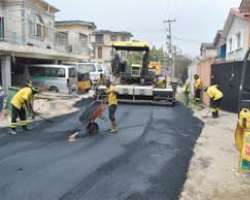Imperatives Of Proper Road Infrastructure Maintenance Culture

At the moment, a drive through the streets and highways of Lagos will reveal that roads had either been repaired or being fixed across many locations. The current effort has impressively reduced the number of bad roads in the State. Recall that the ‘T’ in the current administration’s THEMES agenda stands for ‘Transportation and Traffic Management’. Cheerfully, the State government is making commendable efforts to achieve this.
However, as we continue to prepare for the rains, people have not stopped expressing apprehension on road transport infrastructure challenges associated with the rainy season. Probably, the fear cannot be dismissed as unfounded. The Babajide Sanwo-Olu administration came on board at the peak of the rainy season when many roads in the State were in poor shape.
To address this, the government has not only commenced massive drain clearing, repair of collapsed drains and patching work on roads, but has also embarked on massive reorientation of residents on habits that damage roads.
One significant modification under this government is the management of road asset through the application of engineering, financial and management practices to optimize the level-of-service outcome in return for the most cost-effective financial input. Currently, the State Ministry of Works and Infrastructure now use camera to monitor engineers that work on site to determine the level of work done. Hence, the Ministry no longer wait for its engineers to give reports. This is readily generated through the use of technology. Also, community leaders are now actively involved in project monitoring.
Through the narrative is steadily changing, certain issues are still being raised in the media space and such must be adequately addressed. There is also, the need to educate and enlighten the public on the activities that lead to road degradation. The abuse of drainage channels, burning fire on the road in place of caution signs, spilling of petroleum products on the asphalt, cutting of pavement and blocking of weep holes are some of the activities that have huge consequences on the state of road infrastructure in the State.
Now is the best time to educate the residents on roads and drainages maintenance culture, especially in view of the enormous resources government expend on road projects across the State. It is a truism that Lagos cannot build its way out of congestion or achieve zero tolerance for potholes alone without a positive change in the attitude of residents.
As we prepare for the rains, Lagos residents must take ownership of all road infrastructure in their respective areas. This would go a long way in reducing the rate at which roads and drainages are damaged due to human factors. This way, government’s efforts on road rehabilitation and drainage clearing would become more sustainable, particularly during the rainy season.
Road maintenance is essential in order to preserve the road in its originally constructed condition, protect adjacent resources and user safety, and provide efficient, convenient travel along the route. Unfortunately, we always blame and expect government to solve all problems without focusing on relationships between our conducts and the problems.
It is no longer uncommon to find huge piles of wastes, old house items, construction wastes or used products dumped by the road side or straight into the drains. This trend is a problem because it hinders the realization of the ‘Greater Lagos” agenda. It contributes to road damage and hinders the effort of keeping our environment clean.
It may never be distinctively clear, but burning or cooking on the road, street parking, spilling of waste oil by mechanics as well as spattering of water by car wash operators are part of unlawful road activities that damage roads. Year in year out, millions of naira in term of taxpayers’ money is committed toward rehabilitating the same road. Ironically, the question from the public is always: What the government is doing to make the roads durable and sustainable?
Presently, the government is set to commence the construction of 19.39 km Ijeododo-Abule Ado networks of roads in Ojo Local Government Area. On inspection of the area, several properties were discovered to have been built illegally on drain channels. For the road to go on, the illegal structures must go. If not, it will amount to throwing taxpayers money into the drain. These are some of the issues that complicate execution of road projects across the State. We cannot be encouraging unwholesome activities on the road and expect same road to endure.
Nobody enjoys driving on bad, rough and gully-ridden roads. Like his predecessors Alhaji Lateef Jakande, Asiwaju Bola Tinubu and others did, Governor Sanwo-Olu has adopted a zero tolerance policy for potholes. It is only when this happens that the State engineers are seen to be earning their pay. They have hit the streets patching up broken spots. It is time for Lagosians to understand their role and play their part.
Therefore, with the pro-active measures of the State, residents need to change their attitude towards road infrastructure. The government appreciates that good roads mean easier commuting, while bad roads portend wastage of man hour.
No doubt, good roads have a premium of place in the Greater Lagos journey. However, proper maintenance of road infrastructure put in place with our commonwealth must not be the responsibility of all.
Musbau is Assistant Director, Public Affairs Unit, Lagos State Ministry of Works and Infrastructure.
